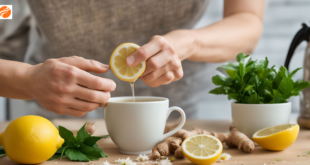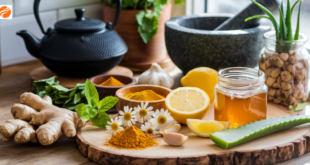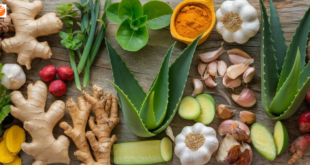
Digestive health plays a vital role in your overall well-being. From bloating to heartburn and indigestion, digestive issues can cause significant discomfort and negatively impact your quality of life. While over-the-counter medications may provide temporary relief, many people are turning to natural remedies for long-term digestive health solutions. Incorporating these remedies can promote better gut function, reduce inflammation, and support overall digestive well-being. Below, we explore the best natural remedies for digestive health, backed by science and practical experience.
Table of Contents
1. Ginger for Indigestion and Nausea
Ginger has been used for centuries in traditional medicine to treat indigestion, nausea, and bloating. This powerful root contains active compounds like gingerol and shogaol, which help relax the muscles in your digestive tract, allowing food to pass through more easily.
How it Helps:
Ginger stimulates saliva, bile, and gastric juices, which aid digestion. It also helps reduce nausea and bloating, making it ideal for those who suffer from indigestion or irritable bowel syndrome (IBS).
How to Use:
- Drink ginger tea before or after meals to aid digestion.
- Add fresh ginger to smoothies, soups, or stir-fries.
- Take ginger supplements for more concentrated relief from digestive discomfort.
2. Peppermint Oil for IBS and Bloating Relief
Peppermint oil is one of the best natural remedies for irritable bowel syndrome (IBS) and bloating. The menthol in peppermint oil helps relax the muscles of the gastrointestinal tract, reducing symptoms like cramping, gas, and bloating.
How it Helps:
Studies show that peppermint oil can reduce the intensity and frequency of IBS symptoms. Its antispasmodic properties make it effective at easing stomach cramps and reducing bloating.
How to Use:
- Take enteric-coated peppermint oil capsules, which are specially designed to prevent the oil from breaking down too quickly in the stomach.
- Drink peppermint tea to alleviate bloating and indigestion.
3. Probiotics for Gut Health
Probiotics are live bacteria and yeasts that are good for your digestive system. They naturally occur in fermented foods and can also be taken as supplements. These “good” bacteria help maintain the natural balance of microflora in your gut, improving digestion and strengthening the immune system.
How it Helps:
Probiotics replenish the good bacteria in your gut, which can be disrupted by factors such as stress, poor diet, or antibiotic use. They are particularly helpful for those dealing with conditions like diarrhea, IBS, and inflammatory bowel disease (IBD).
How to Use:
- Incorporate probiotic-rich foods like yogurt, kefir, sauerkraut, kimchi, and miso into your diet.
- Take a daily probiotic supplement to support gut health, particularly after antibiotic use.
4. Fiber for Regular Bowel Movements
Fiber is essential for digestive health, helping to regulate bowel movements and prevent constipation. A high-fiber diet keeps food moving smoothly through the digestive system, reducing the likelihood of bloating, gas, and cramping.
How it Helps:
Soluble fiber absorbs water and forms a gel-like substance in your gut, which helps bulk up stools and prevent constipation. Insoluble fiber adds bulk to stools and speeds up the passage of food through the stomach and intestines.
How to Use:
- Eat fiber-rich foods like fruits, vegetables, legumes, whole grains, and nuts.
- Gradually increase fiber intake if you’re not used to a high-fiber diet, and drink plenty of water to help the fiber move through your system.
also read How to Boost Your Immune System Naturally: Top 6 Tips for Stronger Immunity
5. Apple Cider Vinegar for Acid Reflux
Apple cider vinegar (ACV) has gained popularity as a natural remedy for acid reflux and heartburn. Although it may seem counterintuitive to treat acid reflux with vinegar, the acetic acid in ACV helps balance the pH levels in the stomach, preventing excess acidity.
How it Helps:
ACV can increase stomach acid production, which aids in the digestion of food and prevents acid reflux. It is also believed to kill harmful bacteria in the digestive tract.
How to Use:
- Mix 1-2 tablespoons of raw, unfiltered apple cider vinegar in a glass of water and drink before meals to prevent heartburn.
- Add a splash of ACV to salads or use it in marinades for a daily dose.
6. Chamomile Tea for Digestive Relief
Chamomile is well known for its calming and soothing properties, and it’s also beneficial for digestive health. Chamomile tea can help reduce stomach cramps, bloating, and indigestion. Its anti-inflammatory and antispasmodic properties make it an excellent choice for calming an upset stomach.
How it Helps:
Chamomile contains compounds that relax the muscles of the intestines, promoting better digestion and easing symptoms of IBS and indigestion.
How to Use:
- Drink chamomile tea before or after meals to soothe your digestive system.
- Use chamomile as a supplement or extract to help manage digestive discomfort.
7. Aloe Vera Juice for Acid Reflux and Constipation
Aloe vera juice is commonly used as a natural remedy for acid reflux, as well as for constipation. The juice contains compounds that can soothe inflammation in the digestive tract and promote regular bowel movements.
How it Helps:
Aloe vera has natural anti-inflammatory properties, which can reduce irritation in the esophagus caused by acid reflux. It also has a mild laxative effect, making it helpful for people suffering from constipation.
How to Use:
- Drink aloe vera juice in small amounts before meals to help with acid reflux.
- Make sure to choose a brand labeled for internal use, and avoid overconsumption, as aloe vera can have a strong laxative effect.
8. Licorice Root for Stomach Ulcers
Licorice root, specifically the deglycyrrhizinated form (DGL), is a natural remedy for stomach ulcers and acid reflux. DGL helps the stomach and intestines repair themselves by promoting mucus production, which protects the stomach lining.
How it Helps:
Licorice root has anti-inflammatory and soothing effects, which help heal the stomach lining and reduce symptoms of gastritis, acid reflux, and ulcers.
How to Use:
- Chew on DGL tablets before meals to help protect the stomach lining and ease digestion.
- Drink licorice root tea for soothing relief from digestive discomfort.
9. Fennel Seeds for Bloating and Gas
Fennel seeds have been used for centuries to relieve digestive issues such as bloating, gas, and cramping. They contain compounds that relax the muscles in the digestive tract, allowing gas to pass and reducing bloating.
How it Helps:
Fennel seeds have carminative properties, which help to expel gas from the digestive tract, reducing discomfort and bloating.
How to Use:
- Chew on fennel seeds after a meal to prevent gas and bloating.
- Make fennel tea by steeping crushed seeds in hot water for 10 minutes.
10. Turmeric for Inflammation and Gut Health
Turmeric is a powerful anti-inflammatory spice that can help reduce inflammation in the digestive tract. Curcumin, the active compound in turmeric, has been shown to improve gut health by reducing symptoms of IBS, indigestion, and colitis.
How it Helps:
Curcumin’s anti-inflammatory properties can help soothe the digestive tract, improving symptoms like bloating, cramping, and pain in conditions like IBS and ulcerative colitis.
How to Use:
- Add turmeric to your meals or smoothies for a daily anti-inflammatory boost.
- Take curcumin supplements for concentrated benefits, particularly for managing chronic inflammation in the gut.
Conclusion: Strengthening Digestive Health with Natural Remedies
Improving your digestive health doesn’t always require medication. Natural remedies, including herbal treatments, dietary changes, and lifestyle adjustments, can help support and restore gut function over time. Incorporating ginger, probiotics, fiber, and other digestive-friendly remedies into your routine can reduce discomfort and promote better overall health. Remember to consult with a healthcare professional before starting any new supplements, especially if you have underlying health conditions.
for more info click here
FAQs
1. Are natural remedies effective for all types of digestive issues?
Natural remedies can be effective for many common digestive problems such as bloating, indigestion, and constipation. However, more severe conditions like chronic acid reflux or ulcers may require medical treatment, so always consult a doctor.
2. How long does it take for natural remedies to improve digestive health?
The effects of natural remedies vary depending on the individual and the condition being treated. Some, like ginger tea for indigestion, may provide immediate relief, while others, like probiotics, may take weeks to show noticeable improvements.
3. Can I combine multiple natural remedies for digestive health?
Yes, many natural remedies complement each other. For example, you can drink chamomile tea for relaxation while taking probiotics to improve gut flora. However, always consult with a healthcare professional before combining supplements.
 Health live a Healthy life
Health live a Healthy life








4 comments
Pingback: Top 8 Effective Diet Tips to Lose Fat and Build Lean Muscle: Why Protein Is Key
Pingback: Understanding the Mechanisms Weight Loss:Top 8 Key Insights for Sustainable Health
Pingback: Exploring the Impact of Community-Based Interventions on Public Health: Latest Findings
Pingback: Top 10 Herbal Teas for Health: Best Teas for Relaxation, Digestion, and Immunity